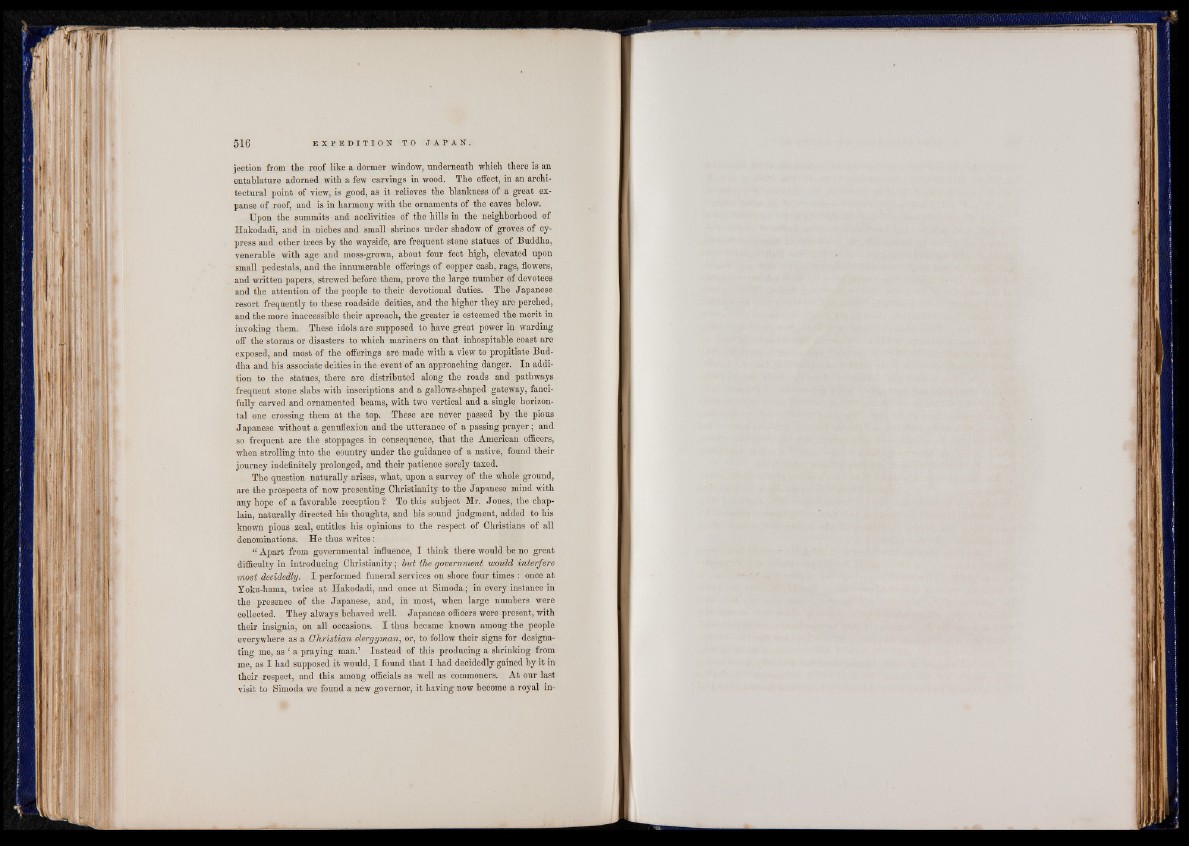
jection from the roof like a dormer window, underneath which there is an
entablature adorned with a few carvings in wood. The effect, in an architectural
point of view, is good, as it relieves the blankness of a great expanse
of roof, and is in harmony with the ornaments of the eaves below.
Upon the summits and acclivities of the hills in the neighborhood of
Hakodadi, and in niches and small shrines under shadow of groves of cypress
and other trees by the wayside, are frequent stone statues of Buddha,
venerable with age and moss-grown, about four feet high, elevated upon
small pedestals, and the innumerable offerings of copper cash, rags, flowers,
and written papers, strewed before them, prove the large number of devotees
and the attention of the people to their devotional duties. The Japanese
resort frequently to these roadside deities, and the higher they are perched,
and the more inaccessible their aproach, the greater is esteemed the merit in
invoking them. These idols are supposed to have great power in warding
off the storms or disasters to which mariners on that inhospitable coast are
exposed, and most of the offerings are made with a view to propitiate Buddha
and his associate deities in the event of an approaching danger. In addition
to the statues, there are distributed along the roads and pathways
frequent stone slabs with inscriptions and a gallows-shaped gateway, fancifully
carved and ornamented beams, with two vertical and a single horizontal
one crossing them at the top. These are never passed by the pious
Japanese without a genuflexion and the utterance of a passing prayer; and
so frequent are the stoppages in consequence, that the American officers,
when strolling into the country under the guidance of a native, found their
journey indefinitely prolonged, and their patience sorely taxed.
The question naturally arises, what, upon a survey of the whole ground,
are the prospects of now presenting Christianity to the Japanese mind with
any hope of a favorable reception? To this subject Mr. Jones, the chaplain,
naturally directed his thoughts, and his sound judgment, added to his
known pious zeal, entitles his opinions to the respect of Christians of all
denominations. He thus writes:
“ Apart from governmental influence, I think there would be no great
difficulty in introducing Christianity; but the government would interfere
most decidedly. I performed funeral services on shore four times : once at
Yoku-hama, twice at Hakodadi, and once at Simoda; in every instance in
the presence of the Japanese, and, in most, when large numbers were
collected. They always behaved well. Japanese officers were present, with
their insignia, on all occasions. I thus became known among the people
everywhere as a Christian clergyman, or, to follow their signs for designating
me, as 1 a praying man.’ Instead of this producing a shrinking from
me, as I had supposed it would, I found that I had decidedly gained by it in
their respect, and this among officials as well as commoners. At our last
visit to Simoda we found a new governor, it having now become a royal in